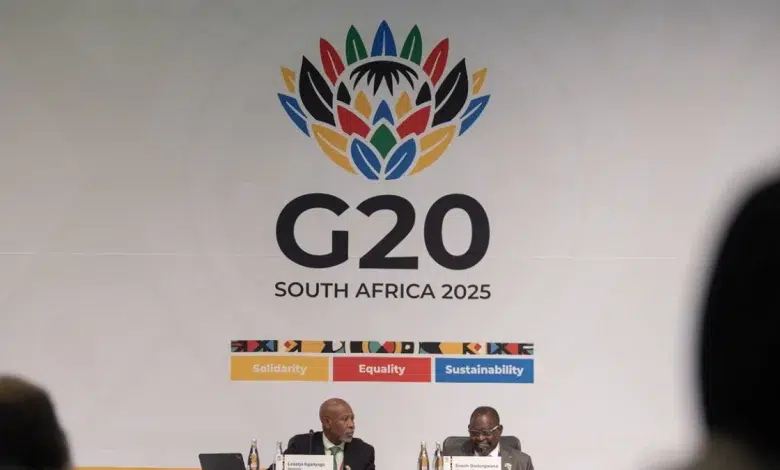SA Pushes Climate Priorities at G20 Environment Summit

South Africa’s Climate Leadership in the 2025 G20 Presidency: Advancing Global Sustainability at the ECSWG Technical Meeting
South Africa is taking a leading role in addressing global environmental challenges during its 2025 G20 Presidency. As part of its commitment to fostering international collaboration on sustainability, the country hosted the second in-person G20 Environment and Climate Sustainability Working Group (ECSWG) technical meeting from 14 to 18 July 2025 at the iconic Kruger National Park in Mpumalanga. This significant event signals South Africa’s pivotal role in steering global cooperation on environmental issues. It is particularly important ahead of the November G20 Leaders’ Summit.

ALSO READ: South Africa Tightens Security Ahead of G20 Summit, Says Ntshavheni
South Africa’s G20 Presidency and Climate Leadership
South Africa assumed the prestigious G20 Presidency on 1 December 2024, and will continue to lead the group throughout 2025. This occurs just five years before the UN’s 2030 Agenda deadline. The presidency’s theme, “Solidarity, Equality and Sustainability,” underscores South Africa’s call for urgent collective action. The aim is to tackle the interconnected crises of poverty, inequality, and environmental degradation.
The Minister of Forestry, Fisheries and the Environment, Dr. Dion George, is at the helm of the ECSWG. This group plays a crucial role in advancing the environmental dimensions of the 2030 Sustainable Development Goals (SDGs). It addresses key challenges like climate change, biodiversity loss, pollution, and marine conservation. The ECSWG facilitates collaboration between G20 member states and invited nations to align their efforts on these urgent issues.
Key Environmental Priorities on the Agenda
The July 2025 technical meeting centered on South Africa’s policy priorities and aligned global efforts with the international sustainability agenda. The meeting focused on five key environmental areas that form the ECSWG’s agenda for 2025:
- Biodiversity and Conservation: Ensuring the full implementation of the Global Biodiversity Framework, while promoting the biodiversity economy to support conservation efforts and sustainable development.
- Land Degradation, Desertification, and Drought: Committing to land degradation neutrality to combat desertification, restore ecosystems, and manage soil resources sustainably.
- Chemicals and Waste Management: Advancing initiatives for sustainable chemical use, embracing circular economy principles, and exploring waste-to-energy technologies. The group is also working to implement Extended Producer Responsibility (EPR) strategies to reduce waste and pollution.
- Climate Change and Air Quality: Addressing key issues such as climate resilience, adaptation, and climate finance. The discussions also focused on just transition pathways and improving air quality to mitigate the effects of climate change.
- Oceans and Coastal Management: Promoting marine spatial planning and ocean governance, as well as tackling the ever-growing issue of marine plastic pollution.
Meeting Outcomes: Progress and Momentum
The in-person technical meeting brought together over 250 delegates from G20 member countries, invited nations, international organizations, and media. Together, they reviewed progress on deliverables, shared best practices, and identified areas for enhanced cooperation. South Africa’s ability to facilitate such a forum is a testament to its commitment. It fosters collaborative and actionable approaches that can effectively address climate and environmental challenges on the global stage.
As the coordinator of the ECSWG activities, South Africa’s Department of Forestry, Fisheries, and the Environment (DFFE) is responsible for convening three major sessions in 2025: a virtual meeting, the recent in-person technical session, and a ministerial meeting scheduled for October. These sessions will pave the way for the G20 Leaders’ Summit in November. There, heads of state will take up the critical climate discussions.
The Bigger Picture: Achieving UN 2030 Agenda Goals
The G20 countries collectively represent about 85% of global GDP and two-thirds of the world’s population. This makes them central to achieving the UN SDGs. However, despite their economic power, UN Secretary-General António Guterres has voiced concerns over the slow progress toward achieving the SDGs. He is calling for a paradigm shift and a renewed commitment to actionable solutions.
South Africa’s leadership at the G20’s ECSWG comes at a crucial time. The exchanges and collaborations fostered at the technical meetings will be pivotal in accelerating global climate action. Additionally, they will enhance climate finance and ensure that sustainability is embedded into economic recovery efforts worldwide. By guiding global cooperation on these pressing issues, South Africa is not only advancing its climate agenda but also contributing significantly to the global push for a more sustainable and equitable future.
South Africa’s Role in Steering Global Environmental Action
As the G20 Presidency and host of critical climate discussions in 2025, South Africa’s leadership role is more important than ever. The ECSWG’s technical meetings and subsequent ministerial sessions will provide the foundation for a unified global response to climate challenges. With a focus on environmental solidarity and sustainability, South Africa continues to demonstrate that collaborative, action-driven approaches are essential for addressing the most urgent environmental and climate-related crises facing the world today.




